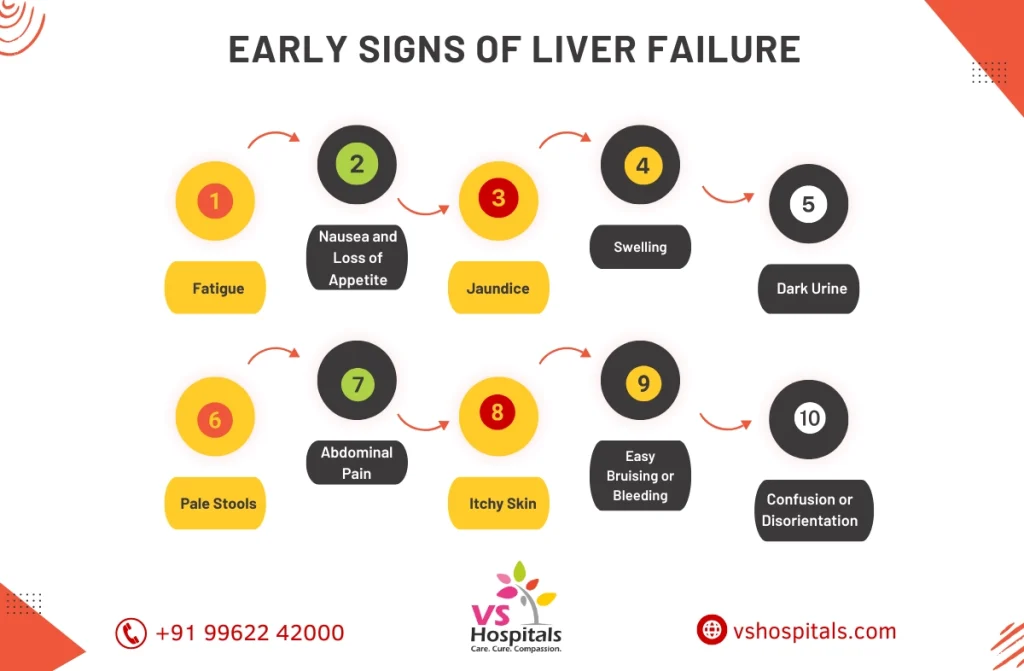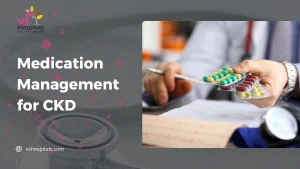Early signs of liver failure can be subtle but are crucial to recognize for timely intervention. The liver plays a vital role in detoxifying the body, supporting digestion, and managing essential nutrients, making its health essential to overall well-being. Ignoring early symptoms, such as fatigue or yellowing skin, can lead to serious complications. By understanding the early signs of liver failure, you can seek medical attention promptly, potentially preventing severe damage and supporting long-term liver health.

What is Liver Failure?
Liver failure is a serious condition in which the liver loses its ability to carry out vital functions, such as detoxifying the blood, aiding in digestion, and producing essential proteins for blood clotting and immune health. It can occur suddenly, known as acute liver failure, or gradually over time due to chronic conditions like cirrhosis, which leads to chronic liver failure. When the liver fails, its capacity to detoxify the blood diminishes, causing a buildup of harmful toxins. Additionally, the liver’s role in producing bile to aid digestion and in creating proteins for clotting becomes compromised. In advanced cases, liver failure can become life-threatening, making prompt medical attention essential.
Early Signs of Liver Failure
Recognizing the early signs of liver failure is essential for prompt intervention. Often, symptoms are subtle and can be mistaken for other issues, but paying attention to changes in your body can make a life-saving difference. These signs indicate that your liver might be struggling to perform its vital functions, like filtering toxins and aiding digestion. Common first symptoms of liver disease include:
- Fatigue: Persistent tiredness, even after rest, may signal liver strain.
- Nausea and Loss of Appetite: Feeling queasy or not wanting to eat can be an early warning.
- Jaundice: Yellowing of the skin and eyes indicates toxin build-up.
If you notice these early signs of liver failure, consult a specialist at VS Hospitals for a thorough evaluation. Early treatment can help manage and possibly reverse damage.
Symptoms of Liver Disease
The first symptoms of liver disease can often be subtle but are essential to recognize early on. These signs indicate that the liver is struggling to function properly, even if major damage has not yet occurred. Early intervention can be life-saving. Common early signs of liver failure include:
- Fatigue: Persistent tiredness that doesn’t improve with rest.
- Nausea and Vomiting: Feeling queasy or experiencing an upset stomach frequently.
- Jaundice: Yellowing of the skin and eyes, often one of the first symptoms of liver disease.
- Swelling: Bloating or swelling in the abdomen, legs, or ankles.
- Dark Urine and Pale Stool: Changes in bodily waste color.
Noticing these early signs of liver failure can help prompt timely medical advice, especially from experts like VS Hospitals.
Types of Liver Failure
Understanding the different types of liver failure is crucial for early detection and effective treatment. Liver failure is primarily categorized into two types:
Acute Liver Failure: This type occurs suddenly, often within days or weeks, and is typically caused by factors such as viral infections (e.g., hepatitis), drug toxicity (notably acetaminophen overdose), or exposure to toxins. Symptoms may include:
- Jaundice (yellowing of the skin and eyes)
- Abdominal pain
- Nausea and vomiting
- Confusion or altered mental state
Chronic Liver Failure: This type develops gradually over months or years, often resulting from long-term conditions like chronic hepatitis, alcohol abuse, or non-alcoholic fatty liver disease. Common symptoms include:
- Fatigue
- Swelling in the legs and abdomen
- Easy bruising or bleeding
- Persistent jaundice
Recognizing these types and their associated symptoms is essential for timely medical intervention and management.
Stages of Liver Failure
Liver failure progresses through several stages, each with distinct characteristics:
- Hepatitis: Initial inflammation of the liver, often due to infections or toxins.
- Fibrosis: Formation of scar tissue as the liver attempts to repair itself, leading to reduced function.
- Cirrhosis: Extensive scarring disrupts liver structure and impairs its ability to function properly.
- End-Stage Liver Disease (ESLD): The liver can no longer perform vital tasks, leading to liver failure.
Recognizing the early signs of liver failure at each stage is crucial for timely intervention and effective management.
Diagnosis and Tests
Diagnosing liver issues early can make a significant difference in treatment success. Recognizing the first symptoms of liver disease can prompt vital tests to detect liver conditions. Here’s an overview of common diagnostic methods:
- Blood Tests: Assess liver enzymes and bilirubin levels to detect inflammation or liver dysfunction.
- Imaging Tests: Ultrasounds, CT scans, and MRIs provide detailed images, revealing potential damage or abnormalities.
- Liver Biopsy: A small tissue sample is examined to understand the extent of liver damage.
Early detection through these tests, especially for early signs of liver failure, allows for more effective management at all stages.
Management and Treatment
Managing liver disease, especially when the early signs of liver failure are detected, involves a combination of medical and lifestyle interventions aimed at reducing liver stress and preventing further damage. Early intervention is crucial, and at VS Hospitals, we provide a tailored approach to help you manage liver health effectively.
- Medications: Prescribed drugs to reduce inflammation or treat underlying infections.
- Lifestyle Changes: Avoiding alcohol, consuming a balanced diet, and exercising regularly to support liver function.
- Advanced Treatments: Surgery or a liver transplant for cases where damage is severe.
At VS Hospitals, our specialists guide patients through each stage, prioritizing personalized care and support.
Conclusion
Recognizing the early signs of liver failure is essential for timely intervention and effective treatment. Symptoms like fatigue, nausea, jaundice, and swelling may indicate liver stress and should not be ignored. Early detection and management can slow or even reverse liver damage. At VS Hospitals, our expert team is dedicated to providing comprehensive care for liver health. If you or a loved one experiences these symptoms, contact VS Hospitals today to explore your treatment options and safeguard your health.




